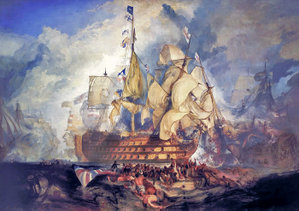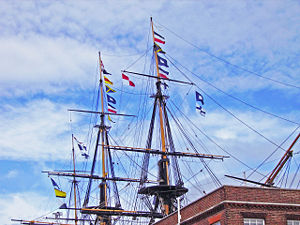England expects that every man will do his duty
2008/9 Schools Wikipedia Selection. Related subjects: British History 1750-1900

"England expects that every man will do his duty" was a signal sent by Admiral Horatio Nelson, 1st Viscount Nelson from his flagship HMS Victory as the Battle of Trafalgar was about to commence on October 21, 1805. Trafalgar was the decisive naval engagement of the Napoleonic Wars. It gave the United Kingdom of Great Britain and Ireland control of the seas, removing all possibility of a French invasion and conquest of Britain. Although there was much confusion surrounding the wording of the signal in the aftermath of the battle, the significance of the victory and Nelson's death during the battle led to the phrase becoming embedded in the English psyche, and it has been regularly quoted, paraphrased and referenced up to the modern day.
Signals during the battle
As the British fleet closed with the opposing combined fleets of France and Spain, Lord Nelson signalled all the necessary battle instructions to his ships. However, aware of the momentousness of events to come, Lord Nelson felt that something extra was required. He instructed his signal officer, Lieutenant John Pasco, to signal to the fleet, as quickly as possible, the message "England confides [i.e. is confident] that every man will do his duty." Pasco suggested to Nelson that expects be substituted for confides, since the former word was in the signal book, whereas confides would have to be spelt out letter-by-letter. Nelson agreed to the change (even though 'expects' gave a less trusting impression than 'confides'):
| “ | His Lordship came to me on the poop, and after ordering certain signals to be made, about a quarter to noon, he said, 'Mr. Pasco, I wish to say to the fleet, ENGLAND CONFIDES THAT EVERY MAN WILL DO HIS DUTY' and he added 'You must be quick, for I have one more to make which is for close action.' I replied, 'If your Lordship will permit me to substitute the confides for expects the signal will soon be completed, because the word expects is in the vocabulary, and confides must be spelt,' His Lordship replied, in haste, and with seeming satisfaction, 'That will do, Pasco, make it directly.' | ” |
The term England was widely used at the time to refer to the United Kingdom, though the British fleet included significant contingents from Ireland, Scotland and Wales as well as England. Thus, at around 11:45 am on October 21, 1805, the most famous naval signal in British history was sent. The exact time the signal was sent is not known (one account puts it as early as ten-thirty), as the message was repeated throughout the fleet and logs would have been written up after the battle, but Pasco puts it at "about a quarter to noon" and logs from other ships of the line also put it close to this time.

The signal was relayed using the numeric flag code known as the "Telegraphic Signals of Marine Vocabulary", devised in 1800 by Rear Admiral Sir Home Popham, and based on the signal books created earlier by Admiral Lord Howe. This code assigned the digits 0 to 9 to ten signal flags. These flags in combination represented code numbers which were assigned meanings by a code book, distributed to all Royal Navy ships and weighted with lead for disposal overboard in case of capture. The code numbers are believed to have been hoisted on the mizzenmast, one after another, with the "telegraphic flag" also being flown to show that the signals employed Popham's code. The word "duty" was not in the codebook, and was not substituted as "confides" had been (the two closest words "best" and "utmost" were not deemed appropriate), so had to be spelt out, meaning the whole message required twelve "lifts". (The word "duty" was coded as shown as the numbers 1–25 stood for the letters A-Z, without J. Moreover, in the alphabet of that time V preceded U.) It is believed that it would have taken about four minutes. A team of four to six men, led by Lt. Pasco, would have prepared and hoisted the flags onboard Lord Nelson's flagship HMS Victory. The message shows one of the shortcomings of Popham's code — even the two-letter "do" required three flags hoisted for the signal. It is reported that a great cheer went up as the signal was hoisted and repeated throughout the fleet.
The message "engage the enemy more closely" was Nelson's final signal to the fleet, sent at 12.15 pm, before a single British cannon had been fired at the enemy. This message was signalled using the telegraphic flag and flags 1 and 6. Nelson ordered this signal hauled up and kept aloft. It remained up until shot away during the battle.
After the battle
Almost immediately, the signal began to be misquoted. A number of ships in the fleet recorded the signal as "England expects every man to do his duty," (omitting "that" and replacing "will" with "to"). This version became so prevalent that it is recorded around the base of Nelson's Column and on his tomb in St. Paul's Cathedral. However, the Victory's log and the accounts of signal officer John Pasco and Henry Blackwood (captain of the frigate Euryalus), both present at the preparation of the signal, agree on the form given here. In 1811, the tenor John Braham composed a song, "The Death of Nelson", including the words of the signal. The song became popular almost immediately and was performed throughout the British Empire during the 19th century. To make the words fit the metre, they were altered to "England expects that every man this day will do his duty". This version of the wording is also persistent.
Between 1885 and 1908 it was believed that the signal had been sent using the 1799 code book, as in 1885 it was pointed out that this had not been replaced until 1808. In 1908 it was discovered, the Admiralty had, in fact, changed the signal code in November 1803, after the 1799 version had been captured by the French, and new code books had been issued to Nelson's fleet at Cadiz in September, 1805. As a result, books published between these two dates show the signal using the wrong flags.
The signal is still hoisted on the Victory at her dry dock in Portsmouth on Trafalgar Day ( 21 October) every year, although the signal flags are displayed all at once, running from fore to aft, rather than hoisted from the mizzenmast.
Similar signals
Nelson's famous signal has been imitated in other navies of the world. Napoleon ordered the French translation, "La France compte que chacun fera son devoir", to be displayed on French vessels. At the opening of the Battle of Plattsburgh in September of 1814, Commodore Thomas MacDonough of the U.S. Navy flew the signal "Impressed seamen call on every man to do his duty", referring to the fact that impressment of U.S. mariners had been a popular cause of the War of 1812. Before the Battle of Tsushima, Japanese Admiral Togo (who had studied naval science in England from 1871 to 1878) signalled to his fleet: "The fate of the Empire depends upon today's battle: let every man do his utmost".
